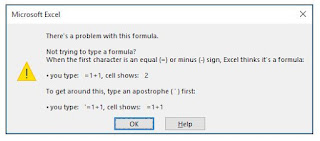I work with Microsoft's spreadsheets occasionally, but if you ask me to create a formula, you'll find me stumped. Sure, I can Google how to do it, but as soon as I apply a formula (likely taking two or three times to get it right), I forget.
My ignorance about Excel formulas is a mystery to Mrs. Brad, who works in spreadsheets all the time.
"It's simple," she'll tell me, when I ask for help. Then she'll tell me something like, "Just click in the top cell, then type in equal symbol and the symbols for alpha and skullduggery, followed by a semicolon, then the formula, using PC smart key symbols rather than the keyboard. After that, type in the monkeypod symbol and drag the cursor down to apply the formula to the entire column. See? It's simple."
Something like that.
Well, if misery loves company, a recent study of office workers provides me with plenty of company.
According to VoiceNation, a telecommunication service that probably wants to sell its services, 81% of U.S. office workers say they struggle with Excel formulas. That was the takeaway from a survey that indicated that 37% of office workers struggle with everyday tasks required of them.
The difference between 81% of us struggling with Excel formulas and only 37% (still a very high number!) struggling with everyday tasks is presumably because most workers aren't required to use Excel in their jobs. They have other issues:
- 77% struggle with formatting Word documents,
- 76% struggle to review documents with tracked changes,
- 75% struggle to format presentations,
- 73% struggle with software designed to set up meetings, and
- 70% struggle with screen sharing on video calls.
There are a lot more, but you get the point: People who work in offices often have a hard time with the basic tasks that their supervisors assume they've mastered. For those of us who struggle, it often feels like our co-workers all know how to do everything, as they blast through a task or send us a document with tracked changes for review or ask us to share your screen on a call while we mumble, then ask, "Can you see it now? How about now?" only to hear them say they can't see our screen.
The authors of the report based on the survey suggested that this indicates the need for better onboarding and more communication with supervisors. However, the data revealed that most of us would rather Google the answer to our problems rather than ask our supervisors, possibly because our supervisor is off-site and may ask us to share our screen with them.
"Can you see it now?" we picture ourselves asking. "How about now?" And our supervisor will say, "No, I can't. Wait a minute, now I can. Except I think this is the other screen. Are you watching a YouTube video of Jim Carrey's funniest movie scenes while working? And where's that Excel document I asked you to send me?"
Technology – even old tech, like Excel – is tough. I know how to do almost all of my job functions, but still take comfort in the fact that I'm not alone in sometimes being mystified by tasks that everyone else seems to have mastered.
Turns out everyone hasn't mastered Excel.
Except Mrs. Brad, who will gladly tell me how to write an Excel formula the next time I want to be totally baffled.
Reach Brad Stanhope at bradstanhope@outlook.com.



